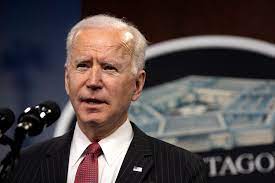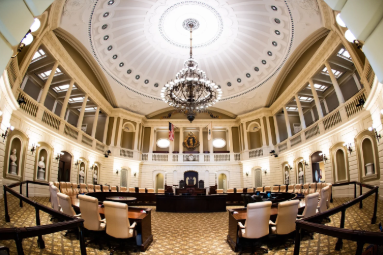As we fast approach the 2024 presidential elections, more and more ads, debates, and campaigns have started to pick up steam. Many candidates have begun to stand out among eligible voters across the country as they listen to the debates and look into the political platforms of those running. As of right now there are currently 15 people running for the highest political position in the country, four of them being democrats, eight republicans, and three independent. Although there’s much to be said about each person’s campaign, and more than enough time for the tides to change, the reelection campaign of our 46th president, Joe Biden, is off to a rocky start.
Originally campaigning against former president Donald Trump in 2020, Biden campaigned on several promises including reviving the economy coming out of the Covid-19 pandemic, ensuring abortion access, student loan forgiveness, strengthening American global leadership, ending gun violence, overhauling immigration policies, and tackling climate change among other things. While there are many parts of Biden’s campaign and subsequent actions while in office worthy of discussion I will address the issues which I would argue are among the most influential while going into the upcoming election year.
Biden let down many voters when he made the decision to approve the Willow Project in Alaska. This went against his previous promise to halt oil drilling on federal lands. Many younger voters were particularly disappointed by this failing as they consider climate change to be among the most pressing issues facing us today. This certainly dented his popularity among voters for the upcoming election, however this alone isn’t enough to sink his election campaign.
When it comes to finances there are two ways in which the Biden administration has failed many voters: this being student loan forgiveness and high inflation. Despite promises made he has been unable to fulfill his promises made about student loan forgiveness which, for many Americans, is a crippling financial burden that they demand their candidates address. Additionally, rising inflation throughout the US has many voters on edge as they face rising rent, as well as high costs associated with groceries and other essential purchases.
When it comes to abortion rights, Biden isn’t directly responsible for the increasing regulation and bans across the country. This decision, instead, was made by the Supreme Court when they decided to overturn Roe v. Wade, leaving regulation surrounding abortion up to individual states. This decision would lead to tightening abortion laws across the country restricting access for women and causing nationwide protest. Though Biden was not directly involved with the decision, because he was in office while the decision was made it has reflected poorly on his entire administration. Additionally, he isn’t able to secure the votes to codify Roe v. Wade into national law, nor is his administration willing to take more drastic steps to ensure nationwide access to abortion at the risk of tying it up in a legal battle as well as alienating some of its voters. This has frustrated many voters across the country, particularly young female voters who were depending on him to make every effort to protect their right to abortion.
Finally, while there are many things that could be said about the U.S.’s global leadership during the Biden administration, the issue that is most likely to sink his re-election campaign is the alignment of the US military with Israel during the Israel/Palestine conflict. The conflict, which has picked up in intensity since October 7, has resulted in over 10,000 Palestinian deaths in a little over a month, has drawn global attention. Although many governments across the world have voiced their voice of support for Israel, there is a widespread disconnect between voters and their representatives. More than half of US voters are reported to be in favor of a ceasefire, with a Reuters poll reporting the number to be at 68 percent, however Biden has stated on multiple occasions that the U.S. will not call for a ceasefire and has instead worked to have billions of dollars in aid sent to support the Israeli government. Among Gen-Z in particular, many of whom are going to be of voting age in the upcoming election, this is a largely unpopular move.
There’s no way to guarantee that any one of these things will ensure that Biden will not be able to win in the upcoming election. In fact, in 2020 it was similarly speculated that he wouldn’t be able to win but was able to pull through. However, I would argue that we won’t be seeing a repeat of this. With Biden having an approval rating in the low thirties and many declaring on social media that they won’t be voting for Joe Biden no matter what, it’s unlikely that Biden is going to be able to garner the approval needed to win in-between now and the election.
When we look at some of the arguments the Democratic party is using to try and repair Biden’s public image they fall short as well. One popular one that has been brought up across news sites and in articles is that Biden is the lesser of two evils. They argue that if we were to compare Trump and Biden at face value Biden is ultimately the better choice no matter what he’s done. However, for young voters, particularly young voters of color, the line between Republicans and Democrats is being blurred. What’s more, they aren’t responding well to the idea that they have to choose between two bad options. Many have called for a mass movement to elect a third party candidate, with Claudia De La Cruz being a popular option on sites like TikTok. Considering that youth mobilization and turn out during the 2020 presidential election, particularly among voters of color, is at least in part what won him the election, losing that support could be devastating to his campaign.
Though Biden has ultimately underwhelmed many who held high hopes for him in 2020, consistently making decisions which have alienated his potential supporters as well as not following through on his promises, the recent conflict in the Middle East may be the final nail in the coffin. It’s not only unpopular, but has come at a critical time during election campaigns where it’s imperative to get as many voters as possible on your side. Though his wave of criticism could be considered nothing more than a reactionary response to an unpopular stance, the timing couldn’t have been worse and many voters will carry their frustrations and anger with them as they head to the polls.














